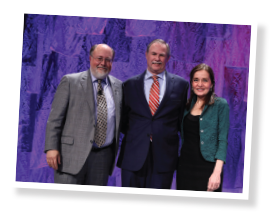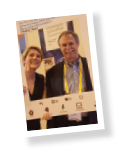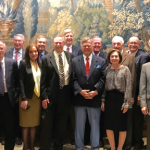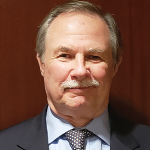‘My job has always been to try & see the big picture, to understand where the organization was, where it was going & what steps we needed to take to keep moving forward.’ —Mark Andrejeski
Rheumatology’s Recognition

David Daikh, MD, PhD,
Mark Andrejeski, and
Paula Marchetta, MD, MBA
When Mr. Andrejeski started his tenure, rheumatologists were considered internists by the U.S. Health Care Finance Administration (HCFA), the precursor to the Centers for Medicare and Medicaid Services (CMS). However, rheumatologists treated patients with complex, chronic diseases. These patients needed repeat office visits and multiple tests and therapies.
“So the HCFA flagged rheumatologists as outliers, because they were doing way more to treat their patients than other internists,” says Mr. Andrejeski. Reimbursement claims were often challenged. “So we had to go through a process to prove who we were and what we do to the U.S. government.” In 1990, HCFA recognized rheumatology as a separate subspecialty.
He cites past ACR presidents Bill Kelley, Paulding Phelps, Jack Stobo, Ira Goldstein, Steve Malawista and John Sergent as early mentors who helped him understand what makes rheumatology unique.
“Rheumatologists are problem solvers. They like puzzles and challenges,” says Mr. Andrejeski. “I’m like that, too. So this job was a good fit for what I am like as an individual and rheumatologists’ phenotype as physicians.”
ACR Past President David Wofsy, MD, MACR, Distinguished Professor of Medicine and Microbiology/Immunology at the University of California San Francisco School of Medicine, calls Mr. Andrejeski “the key architect and consistent driving force responsible” for the ACR’s growth, financial security and political clout.
“The spirit of common purpose and mutual respect that Mark has fostered among the diverse ACR membership is rare among medical subspecialties, and he has enabled the ACR to dramatically increase its impact,” says Dr. Wofsy. “He’s guided the ACR with unwavering commitment to principle, including in times when the temptation to abandon principle for short-term gain was very tempting.”
Exciting New Era

Julie Anderson, CAE, and Mark Andrejeski at EULAR
One of those times was the late ’90s when the first biologic therapies for rheumatoid arthritis were approved. Drug manufacturers launched advertising campaigns with commercials urging patients to “see your rheumatologist” about these new therapies. Industry came calling with ideas for “how we could work together.” The ACR created its Corporate Roundtable as a response, with clear, contractual relationships with industry partners. It also tightened regulations for industry activities at the Annual Meeting and other educational settings.
Biologics changed rheumatology in dramatic ways, Mr. Andrejeski says, “not only the way we treated patients, but also, from a government standpoint, rheumatology became a very high-expense item specialty. We started getting pushback from payers’ systems again, because rheumatologists were such high users of biological products.”
“The government responded by hitting our members with reduced reimbursements. The impact was significant. The ACR’s government affairs staff and volunteer advocacy became even more important,” he says.


